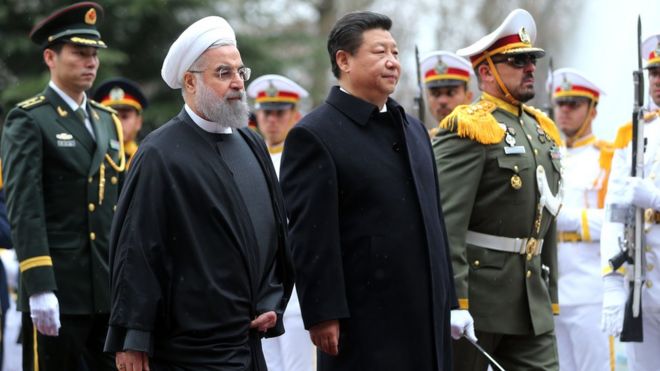Disir
Platinum Member
- Sep 30, 2011
- 28,003
- 9,608
- 910
The Failure of Western Restrictions Against Russia
By Emma Ashford
After Russia seized Crimea from Ukraine in March 2014, the Obama administration responded with what has become the go-to foreign policy tool these days: targeted sanctions. The United States placed asset freezes and travel bans on more than one hundred people, mostly cronies of Russian President Vladimir Putin, and the EU targeted almost a hundred more. The amounts involved have been massive: Bank Rossiya, the Kremlin’s preferred bank, had $572 million frozen in the months after the sanctions were rolled out. Then, in July 2014, when Malaysia Airlines Flight 17 was shot down over eastern Ukraine allegedly by Russian-backed forces, Washington responded with more severe sanctions aimed at key sectors of the Russian economy, including arms manufacturers, banks, and state firms. In an effort to hit the Kremlin where it hurts, the measures inhibit financing and technology transfers to Russian oil and gas companies, which supply over half of state revenues.
Considering the dire state of Russia’s economy, these sanctions might appear to be working. The value of the ruble has fallen by 76 percent against the dollar since the restrictions were imposed, and inflation for consumer goods hit 16 percent in 2015. That same year, the International Monetary Fund estimated, Russia’s GDP was to shrink by more than three percent.
In fact, however, Western policymakers got lucky: the sanctions coincided with the collapse of global oil prices, worsening, but not causing, Russia’s economic decline. The ruble’s exchange rate has tracked global oil prices more closely than any new sanctions, and many of the actions taken by the Russian government, including the slashing of the state budget, are similar to those it took when oil prices fell during the 2008 financial crisis. The sanctions have inhibited access to Western financing, forcing Russian banks to turn to the government for help. This has run down the Kremlin’s foreign reserves and led the government to engage in various unorthodox financial maneuvers, such as allowing the state-owned oil company Rosneft to recapitalize itself from state coffers. Yet the Russian government has been able to weather the crisis by providing emergency capital to wobbling banks, allowing the ruble to float freely, and making targeted cuts to the state budget while providing fiscal stimulus through increased spending on pensions. Even with continued low oil prices, the International Monetary Fund expects that growth will return to the Russian economy in 2016, albeit at a sluggish 1.5 percent.
Nor are the sanctions inflicting much pain on Russia’s elites. Although Prada and Tiffany are doing less business in Moscow, the luxury housing market is anemic, and travel bans rule out weekend jaunts to Manhattan, these restrictions are hardly unbearable. One target, the close Putin adviser Vladislav Surkov, has dismissed them as harmless. “The only things that interest me in the U.S. are Tupac Shakur, Allen Ginsberg, and Jackson Pollock,” he said. “I don’t need a visa to access their work.”
And when the sanctions are judged by the most relevant metric—whether they are producing a policy change—they have been an outright failure. Since the United States imposed the sanctions, Russia has not backed down in Ukraine, and there is no reason to believe that they will force it to do so anytime soon. In the meantime, however, the sanctions are harming U.S. economic and geopolitical interests. If Western leaders want to resolve the Ukraine crisis and meaningfully constrain Russia’s bad behavior, they should abandon their failed sanctions-centric policy and focus on other measures instead, such as efforts to aid Ukraine economically, obstruct Russia’s military modernization, and increase European energy independence.
UNINTENDED CONSEQUENCES
Whatever punishment the sanctions have inflicted on Russia, it has not translated into coercion. The Obama administration appears to have expected that it would have by now: in February 2015, for example, Christine Wormuth, the U.S. undersecretary of defense for policy, admitted that the sanctions had “not changed so far what Russia has been doing on the ground, and that is the great concern.”
Not-So-Smart Sanctions
This is an interesting article IF you can ignore the author stating that the unintended consequence was to punish the people. It is always the intended consequence.
By Emma Ashford
After Russia seized Crimea from Ukraine in March 2014, the Obama administration responded with what has become the go-to foreign policy tool these days: targeted sanctions. The United States placed asset freezes and travel bans on more than one hundred people, mostly cronies of Russian President Vladimir Putin, and the EU targeted almost a hundred more. The amounts involved have been massive: Bank Rossiya, the Kremlin’s preferred bank, had $572 million frozen in the months after the sanctions were rolled out. Then, in July 2014, when Malaysia Airlines Flight 17 was shot down over eastern Ukraine allegedly by Russian-backed forces, Washington responded with more severe sanctions aimed at key sectors of the Russian economy, including arms manufacturers, banks, and state firms. In an effort to hit the Kremlin where it hurts, the measures inhibit financing and technology transfers to Russian oil and gas companies, which supply over half of state revenues.
Considering the dire state of Russia’s economy, these sanctions might appear to be working. The value of the ruble has fallen by 76 percent against the dollar since the restrictions were imposed, and inflation for consumer goods hit 16 percent in 2015. That same year, the International Monetary Fund estimated, Russia’s GDP was to shrink by more than three percent.
In fact, however, Western policymakers got lucky: the sanctions coincided with the collapse of global oil prices, worsening, but not causing, Russia’s economic decline. The ruble’s exchange rate has tracked global oil prices more closely than any new sanctions, and many of the actions taken by the Russian government, including the slashing of the state budget, are similar to those it took when oil prices fell during the 2008 financial crisis. The sanctions have inhibited access to Western financing, forcing Russian banks to turn to the government for help. This has run down the Kremlin’s foreign reserves and led the government to engage in various unorthodox financial maneuvers, such as allowing the state-owned oil company Rosneft to recapitalize itself from state coffers. Yet the Russian government has been able to weather the crisis by providing emergency capital to wobbling banks, allowing the ruble to float freely, and making targeted cuts to the state budget while providing fiscal stimulus through increased spending on pensions. Even with continued low oil prices, the International Monetary Fund expects that growth will return to the Russian economy in 2016, albeit at a sluggish 1.5 percent.
Nor are the sanctions inflicting much pain on Russia’s elites. Although Prada and Tiffany are doing less business in Moscow, the luxury housing market is anemic, and travel bans rule out weekend jaunts to Manhattan, these restrictions are hardly unbearable. One target, the close Putin adviser Vladislav Surkov, has dismissed them as harmless. “The only things that interest me in the U.S. are Tupac Shakur, Allen Ginsberg, and Jackson Pollock,” he said. “I don’t need a visa to access their work.”
And when the sanctions are judged by the most relevant metric—whether they are producing a policy change—they have been an outright failure. Since the United States imposed the sanctions, Russia has not backed down in Ukraine, and there is no reason to believe that they will force it to do so anytime soon. In the meantime, however, the sanctions are harming U.S. economic and geopolitical interests. If Western leaders want to resolve the Ukraine crisis and meaningfully constrain Russia’s bad behavior, they should abandon their failed sanctions-centric policy and focus on other measures instead, such as efforts to aid Ukraine economically, obstruct Russia’s military modernization, and increase European energy independence.
UNINTENDED CONSEQUENCES
Whatever punishment the sanctions have inflicted on Russia, it has not translated into coercion. The Obama administration appears to have expected that it would have by now: in February 2015, for example, Christine Wormuth, the U.S. undersecretary of defense for policy, admitted that the sanctions had “not changed so far what Russia has been doing on the ground, and that is the great concern.”
Not-So-Smart Sanctions
This is an interesting article IF you can ignore the author stating that the unintended consequence was to punish the people. It is always the intended consequence.





